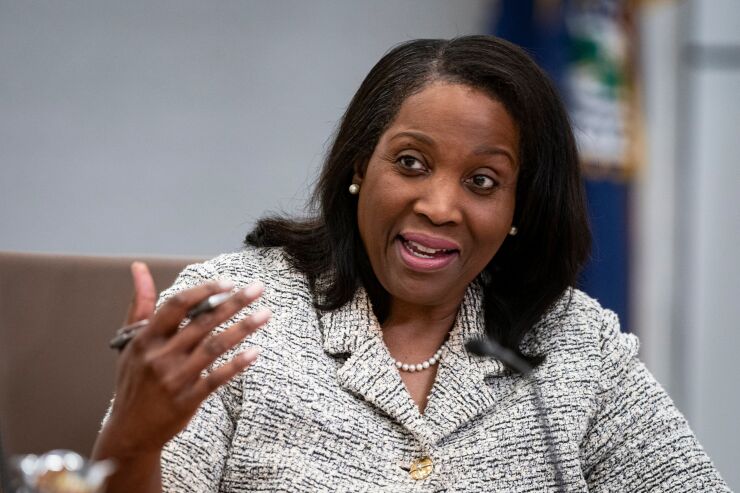
The Federal Reserve is "closely" monitoring recent record high stock market valuations as a potential
Fed
"Having been a stock analyst, I'm always concerned about any increase in value beyond the underlying fundamentals of a company," Cook said after delivering a guest lecture at Harvard University. "We're watching this closely from a financial stability perspective."
Cook
The topic of a stock market bubble was raised in relation to recent record-high closings for the U.S. top exchange. On Friday, the Nasdaq Composite — which is heavily weighted toward the country's top tech firms — closed on a record high. The Dow Jones and S&P 500 indexes also posted their best week of the year.
"We have a dual mandate, but we have other responsibilities including the safety and soundness of the banking system and financial stability," Cook said.
Cook was also asked for her thoughts on the risks posed by climate change, and whether the Fed should consider factors such as higher financing costs for renewable energy projects when setting monetary policy.
While she noted that facilitating investment in renewable energy is squarely a matter of fiscal policy, and therefore outside the purview of the Fed, she said there are financial stability implications related to rising instances of extreme weather. However, she said, how the Fed should incorporate this into its policies has yet to be determined.
"We don't make climate policy, but we look at what's happening around us and look at what it means," she said. "That could be a factor affecting financial stability, but a lot more research is needed to determine exactly how much of a factor that is and what we can do about it."
She also fielded many questions related to artificial intelligence and its impact on the labor market and broader economy, as well as its potential implications on monetary policy.
Cook, who holds two degrees in philosophy as well as a doctorate in economics, said she understands the concerns about technology's potential to displace workers, but noted that history suggests that technological advancements tend to create more jobs than they eliminate. But, she said, some restrictions on the technology and its pursuits could be appropriate.
"There have to be guardrails," she said. "I've been saying this for at least six years, but generative AI has sped up my thinking on that front. There need to be principles in place."
Cook added that one of the biggest issues facing AI systems is one that has long plagued the world of research: the inaccuracy of large datasets. She said that is something she has often dealt with in her own research, but said it is something that can be addressed today.
"There are things we can clean up right now, we don't have to wait," she said.
Cook noted that AI could exacerbate biases in society and, as with climate issues, the Fed has a narrow but important role to play in mitigating this.
"In general, the Fed has limited tools to address inequality. We wouldn't be able to address inequality related to AI, for example, but we do have some limited tools related to fair lending," she said. "Congress has said housing discrimination is illegal, redlining is illegal, so, in our supervisory capacity, we need to make sure lending is happening on a fair and equal basis."






